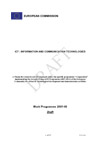 This Work Programme for the ICT theme of the FP7 Specific Programme "Cooperation" defines the priorities for the calls for proposals to be launched in 2007 and the criteria that will be used for evaluating the proposals responding to these calls.
This Work Programme for the ICT theme of the FP7 Specific Programme "Cooperation" defines the priorities for the calls for proposals to be launched in 2007 and the criteria that will be used for evaluating the proposals responding to these calls.
The priorities reflect the input received from the Programme Committee, the IST Advisory Group1 (ISTAG), the European Technology Platforms in ICT and other preparatory activities including workshops involving the main stakeholders. The Work Programme is also in line with the main ICT policy priorities as defined in the i2010 initiative, - a European Information Society for Growth and Employment.
Improving the competitiveness of European industry and enabling Europe to master and shape future developments in ICT so that the demands of its society and economy are met. ICT is at the very core of the knowledge-based society. Activities will strengthen Europe's scientific and technology base and ensure its global leadership in ICT, help drive and stimulate product, service and process innovation and creativity through ICT use and ensure that ICT progress is rapidly transformed into benefits for Europe's citizens, businesses, industry and governments. These activities will also help reduce the digital divide and social exclusion.
For further information and download link, please visit ICT Library.
Please note, a new site has been launched on CORDIS focusing on the ICT research to be funded under the Seventh Framework Programme!
For further information, please visit: ICTs in FP7
Copyright ©European Communities, 2006
Neither the Office for Official Publications of the European Communities, nor any person acting on its behalf, is responsible for the use, which might be made of the attached information. The attached information is drawn from the Community R&D Information Service (CORDIS). The CORDIS services are carried on the CORDIS Host in Luxembourg - http://cordis.europa.eu. Access to CORDIS is currently available free-of-charge.